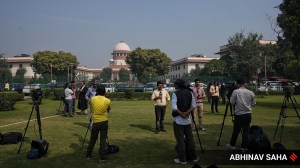- India
- International
Regarding fascism
The point is not that voters want to compromise with communalism for the sake of growth.
The rise of Narendra Modi has brought the “F” word into promiscuous use. The spectre of fascism is said to be haunting India. It is easy to dismiss this concern over fascism as the hyperbole of a crumbling elite that has often used moral outrage as a substitute for addressing genuine political challenges. It might be tempting to engage in an argument over the historical specificity of fascism. Can the the combination of military power, total mobilisation and eliminationism that marked fascism really be reproduced in India?
But take the core concern beneath the hyperbole seriously. The communal atmosphere in some parts of the country is fragile. Dozens of riots in UP testify to this. As Suhas Palshikar had argued, the BJP has regionally varied strategies.
In UP, in particular, it involves fishing in troubled communal waters. Whatever Narendra Modi’s intentions or change of heart might be is besides the point. India still has a communal challenge and ultimately the quality of its democracy will be judged by how it deals with it. You don’t have to subscribe to analytically otiose invocations of fascism to wonder what this election means for India’s prospects as a country where no one is targeted for being who they are. All sides speak about minorities, but few speak to them.
Whatever Amit Shah’s organisational genius might be, his track record should make you nervous about the kind of intimidation he could create. If we end up voting for them, the morning after we will need to think of the kinds of structures that can mitigate the damage they might do. BJP supporters, who might bristle at being called fascist, would do well to act reassuringly on these concerns.
The best way to respond to accusations of fascism is not to dismiss them. It is to make them look silly by your own exemplariness.
But those scare-mongering on fascism also need self-reflection. Many of those dropping the “F” word also betray a will to simplification that tells you more about those making the accusations than it does about politics. The Indian Left is incapable of any dialectical thinking; there is not a trace of reflection on the forces that have brought us to this pass. There should be no complacency over the communal question.
But what is it about the structures of our thinking about communalism that 60 years after Independence, we seem to be revisiting the same questions over and over again? Is there some deeper phenomenon that the BJP-Congress system seems two sides of the same coin to so many, even on this issue? The point is not about the political equivalence of two political parties. People will make up their own minds. But is there something about the way we have conceptualised the problem of majority and minority, trapped in compulsory identities, that makes communalism the inevitable result?

Is there something odd when voting for the Samajwadi Party, which has done its damnedest to stoke communal tension under the garb of electoral secularism, is not fascist, by the same standards? And does it serve the purpose of any kind of democratic accountability to let a party like the Congress, which has done its best to corrode every institution that should be the foundation of protecting equal individual rights for all, consistently get a free pass, based on fear?
In short, if you are serious about the communal question, you will have to think of what it is about the larger political culture that we seem to be trapped in the same discourse all over again. The political construction of identities, shared across parties, has been as much the deep substrate from which this poison springs.
We also need some historical perspective. It is hard to imagine that the same set of urban voters who in 2009 were considered the paragons of social democracy by electing the Congress have all suddenly turned fascist. Yes, these voters are anxious, because India’s growth story is faltering.
And this is where we need some dialectical thinking. Hindu nationalism arose in the 1990s against a backdrop of immense national anxiety: an uncertain economic future, various secessionist movements. The imperatives of creating coalitions, the checks and balances of an immensely complicated institutional structure, helped contain its furies, though not perfectly.
Hindu nationalism dissipated somewhat because of the confidence that growth provided. Growth created a new churning and a different national narrative. It created the circumstances where there was a lot more to lose by violence. This did not, tragically, work in every specific case. But the overall effects were to take the edge off investment in destructive identity politics. It mitigated some of the psychological anxieties from which the furies of nationalism had stemmed. It was the self-confidence and hope in the future that made organisations like the RSS so much less attractive.
It was the cunning of history that a BJP government, unintentionally, created the conditions that undermined the anxieties that fuelled Hindu nationalism. The anxieties returned somewhat when India’s confidence faltered.
The critique of fascism is less effective because it is not playing on the right terrain: a growth narrative that can restore India’s confidence. But the point is not that voters want to compromise with communalism for the sake of growth. What many of them sense, more presciently than academics, is that if this growth story continues to falter, we will create the conditions for the kind of reactionary politics that we have not seen.
They don’t find the Congress credible any longer, or the AAP quite ready. They may be misjudging the economic downsides of any non-BJP alternative. But to think that the social democrats of 2009 have now created a fascist surge is besides the point.
The role of incentives can be exaggerated in politics. But the incentive structures for the BJP at this moment are very different. Large-scale communalisation will, in the long run, create the very uncertainties that can damage growth. Violence may pay in specified local contexts, but beyond a point it backfires nationally.
Democracy cannot be the excuse for immobilising questions of individual liberty and security. But invocations of fascism often express a kind of distance from Indian democracy that is also disquieting. We are not on the high tide of fascism. It is more about a complicated country feeling its way through difficult times, fed up with old power structures. The “F” word has become a substitute for real thinking. We will need to think anew about what incentives and pressures will work in our new context. We are on a wing and a prayer. But we need to show more intelligence than screaming the “F” word.
The writer is president, Centre for Policy Research, Delhi, and a contributing editor for ‘The Indian Express’
express@expressindia.com
EXPRESS OPINION
More Explained
Apr 26: Latest News
- 01
- 02
- 03
- 04
- 05











































